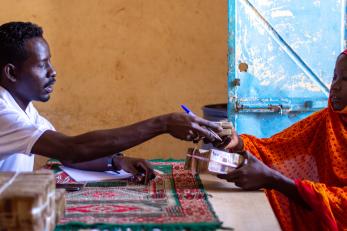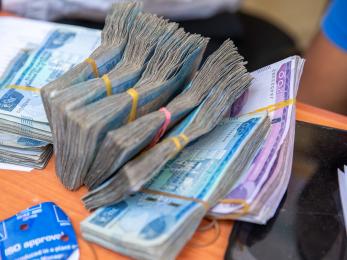From Feasible to Life-Saving
The Urgent Case for Cash at Scale in Sudan

Sudan is on the verge of earning the grim label of “world’s largest hunger crisis”. Nearly a year of brutal conflict has caused the number of people facing acute hunger to almost double, with an estimated 18 million people currently facing severe levels of food insecurity (IPC 3 or above), including five million people facing emergency levels (IPC 4), based on the latest projections.
Humanitarian actors, including local groups such as community-based organisations, are doing everything they can to contain the crisis and have reached nine million people with life-saving assistance between April 2023 and February 2024. Yet, that is barely a third of the 25 million individuals with humanitarian needs this year. Now, a combination of factors including the expansion of the conflict into key agricultural areas, deteriorating humanitarian access, and serious funding shortfalls, is pushing populations closer to famine. Alarmingly, while food is available in local markets, people cannot afford to purchase it. And while humanitarian trucks are loaded with food aid, they cannot reach the large majority of communities in need due to access constraints. Reports of starvation are already happening across Sudan, and food security watchdogs have already confirmed risks of famine during the ongoing lean season.
There is no time to waste in preventing Sudan from plunging into famine. Donors and humanitarian organisations must act urgently to provide people with the means to access food. For Sudan, given the functionality of markets and limited access for in-kind humanitarian aid, this means providing cash transfers to enable people to buy food and other essential items available in local shops. Today, cash programming represents our best strategy for reaching people at scale with a principled, multi-sectoral response in Sudan, providing a lifeline for people, markets, and communities grappling with high levels of food insecurity.
Key recommendations:
- Humanitarian donors should urgently allocate additional funding to cash operations at scale, in particular multi-purpose cash. This is essential to meet urgent and spiraling humanitarian needs today and keep local markets afloat during and beyond the crisis.
- Humanitarian donors and operational agencies should recognise the limits of in-kind assistance in Sudan and urgently adopt a cash first approach as a key market-driven, multi-sectoral pillar of the humanitarian response.
- U.N. humanitarian leadership in Sudan should make cash programming a central pillar of the Famine Prevention Strategy, recognising that cash assistance can reach people where in-kind aid cannot, and that it enables people to drive their own decisions about meeting their basic needs across multiple sectors, while safeguarding the local markets people rely on to buy essential goods, including food.
